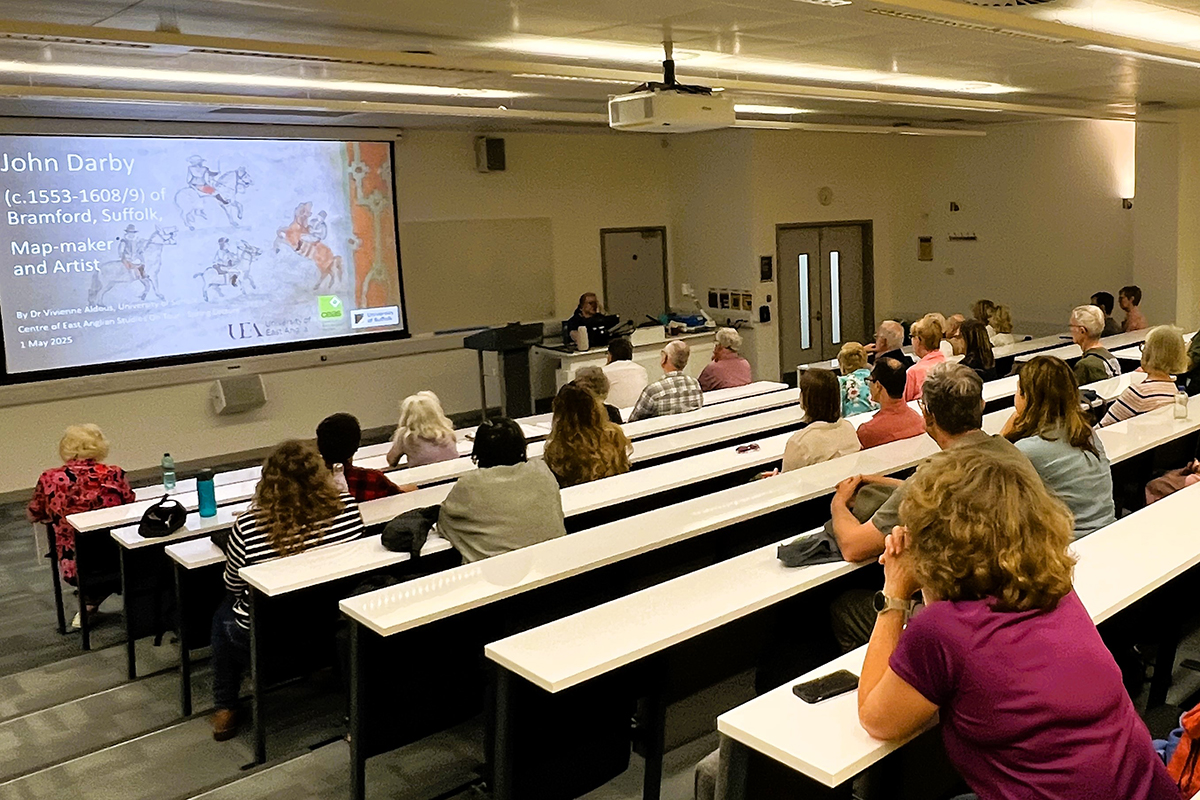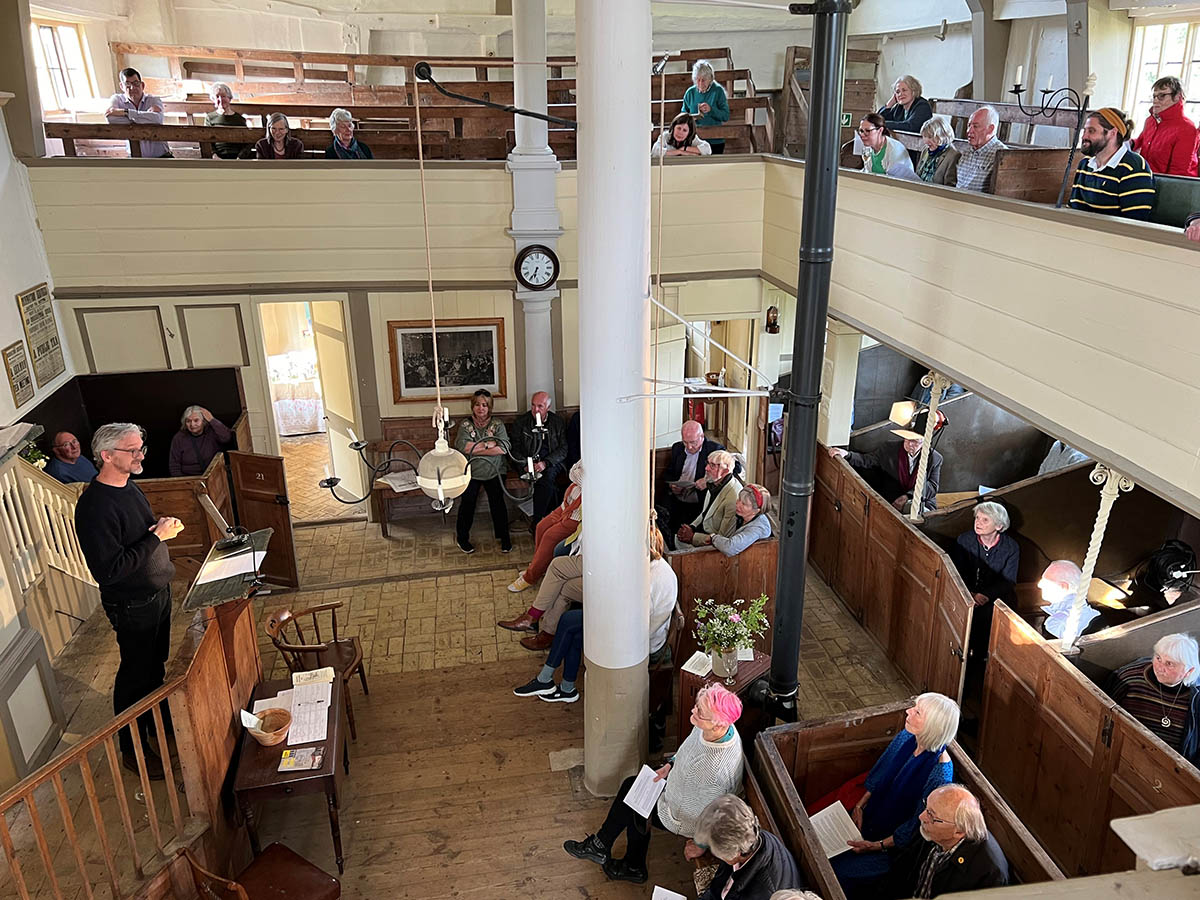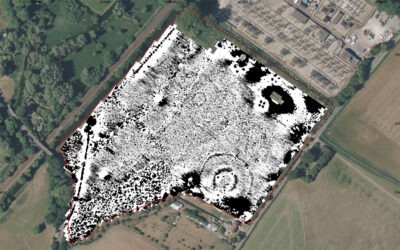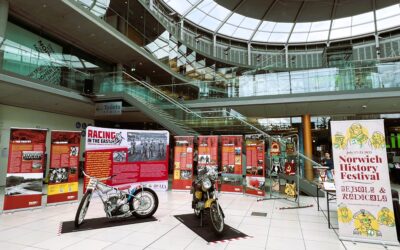Established at UEA in 1967, the Centre for East Anglian Studies (CEAS) was created to encourage and develop the study of all aspects of the archaeology and history of the region from prehistory to the present day
The Centre for East Anglian Studies
The Centre for East Anglian Studies (CEAS) has flourished as a focus for research and teaching which seeks to place the investigation of the region’s past in a comparative and international context from the North Sea and Eastern Europe to the eastern seaboard of America.
It also aims to address wider issues of community and regionality, attracting a steady stream of visiting scholars from nationally and internationally.
Since August 1996 the Centre has been fully integrated into the UEA School of History, and shares with it in the most recent Research Assessment Exercise. Yet, although its current enrolment of postgraduate students testifies to its vibrant research culture, the Centre has always been far more than a university department.

Image: Cunninghams map of Norwich 1588.
From the outset, CEAS has drawn heavily upon the enthusiastic support of members of the East Anglian community. Convinced that research remains sterile unless it can be communicated to the widest possible audience, the Centre looks outwards to the region and beyond, maintaining close and mutually beneficial connections with local societies, institutions and members of the public who share a common commitment to the life and work of the region.
The allure of ‘the local’
The allure of ‘the local’ and the Centre of East Anglian Studies. Carole Rawcliffe, Professor Emeritus of Medieval History and former CEAS Director, in conversation with current CEAS Director Dr Richard Mills.

Image: A Trawler crew at Lowestoft (undated), private collection.
Contact CEAS
Seminars
CEAS spring seminar series.
Spring Seminar Series 2026
Venue: Earlham Hall, University of East Anglia
Free entry. All welcome.
Thursday, 16 April, 17:30 – Andy Hutcheson
‘Always the sun: Arminghall timber circle and henge’s relationship to the celestial and similar monuments, near and far’.
Earlham Hall 0.12
Thursday, 30 April, 17:30 – Philip Woods
‘Travelling with intent to commit breaches of the peace? The response of the authorities to scooter rallies in Great Yarmouth during the 1980s’.
Earlham Hall 0.02
Thursday, 7 May, 17:30 – Hannah Rose-Murray
‘”A Moral Map of the United States”: C19th Black Activism in East Anglia’.
Earlham Hall 0.02
Thursday, 21 May, 17:30 – Meg Bernstein
‘Communal Waters: North Norfolk’s Romanesque Baptismal Fonts’.
Earlham Hall 0.02
CEAS On Tour – in partnership with the University of Suffolk
May, TBC – Charlie Rozier
‘Hollingsworth’s Stowmarket: Unearthing the History of a Suffolk Market Town’, Venue TBC.
Venue TBC

Writing the Fens Symposium – 2025
University of East Anglia
19-20 June

Spring Seminar Series 2025
University of East Anglia
Susan Maddock – ‘”It was pestylens tyme”: the impact of the Black Death in medieval Lynn’
Clare Haynes – ‘Looking back at Norwich’s medieval churches: a case study in using antiquarian illustrations as evidence’.
Postgraduate Research on East Anglia.
Ashley Armstrong – ‘The Bishops of Norwich and their churchwardens, 1558-1640’.
Sandra Browne – ‘”Being sicke in body but perfect in minde…” The lives of single women in the Norwich Diocese (1604-1686) as revealed in their wills’.
Susan Steward – ‘Celebrating Wensum Lodge: The history of a Norwich adult learning centre and its significance to East Anglian life over the last 80 years’.
CEAS On Tour – in partnership with the University of Suffolk
Vivienne Aldous – ‘John Darby, Surveyor and Map Maker’.
University of Suffolk, Ipswich.

Spring Seminar Series 2024
University of East Anglia
Carole Rawcliffe – ‘Northern pride and southern prejudice in sixteenth-century Norwich: The ‘horrrable history’ of Adelston Attysle’
John Alban – ‘The Wymondham Market Charter of 1440’
Louise Kennedy – ‘Easton Bavents c1480-1680; a study of a community, kinship and coastal erosion’
Richard Smith – ‘Suffolk’s roads, waterways, and railways in regional and national comparative perspective 1600-1881: A GIS-based approach’
CEAS On Tour
Joel Halcomb – ‘Walpole and the Puritan Revolution’
Walpole Old Chapel, Walpole, Suffolk – https://walpoleoldchapel.org/
Spring Seminar Series 2023
University of East Anglia
Susan Maddock – “Immigrant integration and the taste for beer in medieval Lynn”
Richard Maguire – “‘Mischief almost ruinous’: The difficulties of running a Jamaican sugar plantation from East Anglia, 1780 to 1845”
Ed Legon – “Weavers Spiritualised: Clothmakers and their Politics in Seventeenth-Century Norwich”
Cris Spinks – “Hipsters, Flipsters, Finger-Poppin’ Daddies: Norwich’s Orford Arms (Orford Cellar)”
Richard Mills – “Racing in the East: Motorcycle Speedway, Transnational Encounters, and Provincial Heartlands”

Images: Centre for East Anglian Studies
CEAS Projects
Some of our projects; past, current and future.
Later Prehistoric Norfolk Project
Arminghall Timber Circle and Henge The Later Prehistoric Norfolk Project¹ is an archaeological research programme examining key aspects of the landscape between the Neolithic (4,000 BCE) and the end of the Iron Age (43 CE). Work to date has focused on the landscapes...
Racing in the East
Motorcycle Speedway, Transnational Encounters, and ‘Provincial Heartlands’ Read this research for free: ‘Pride of the East: Motorcycle Speedway, Transnational Encounters and Provincial Heartlands’, History: The Journal of the Historical Association, 2024,...
Pathways to History
Pathways to History: Researching footpaths and 'green lanes' in Norfolk Public footpaths and countryside access became a highly politicised issue in Britain in the first half of the twentieth century - this was a period in which public awareness of the importance of...
What the Victorians threw away
Our great grandparents the Victorians are not too far away. We can read about them, see them in old photos, even live in their houses. If we really want to get close to them we can visit a museum. Alternatively, we can go through their rubbish. What the Victorians...
Photograph: Castle Meadow, Norwich 1961. Courtesy of Invisible Works.




